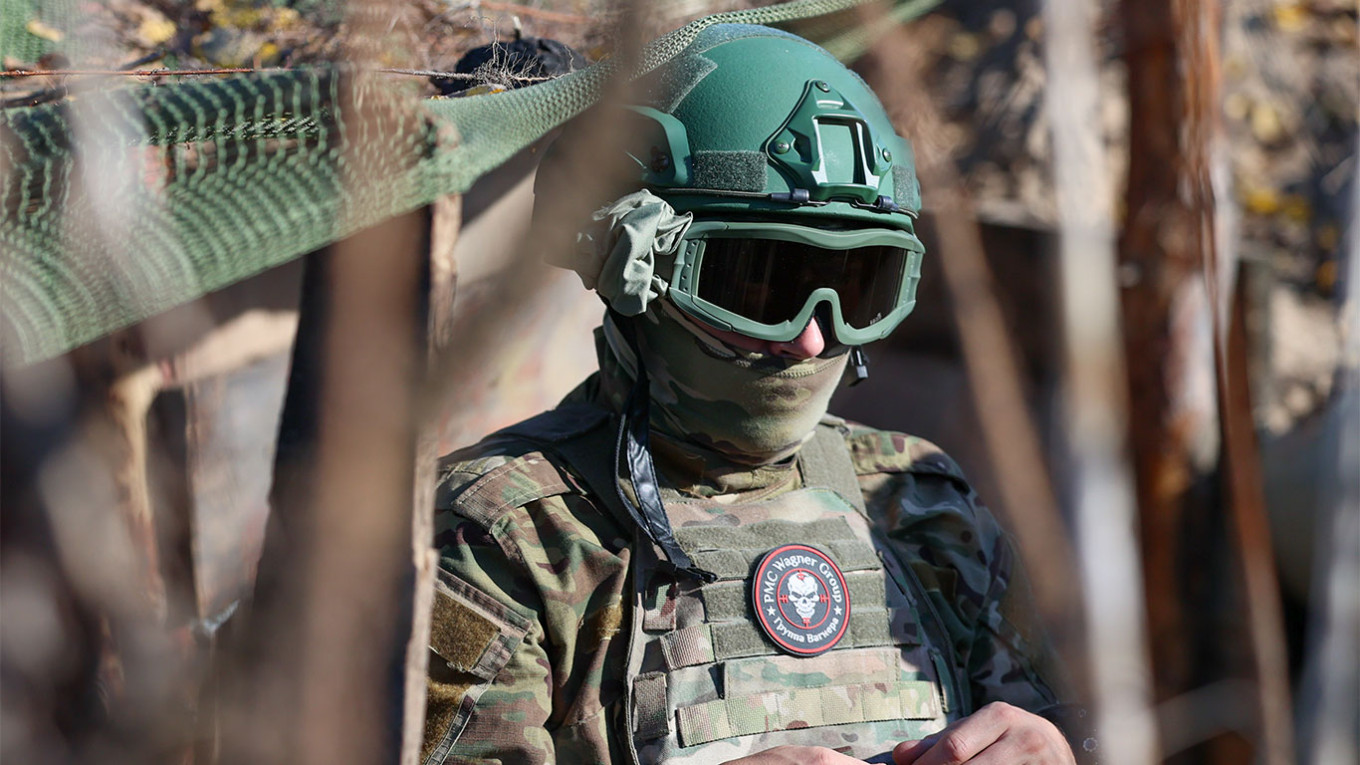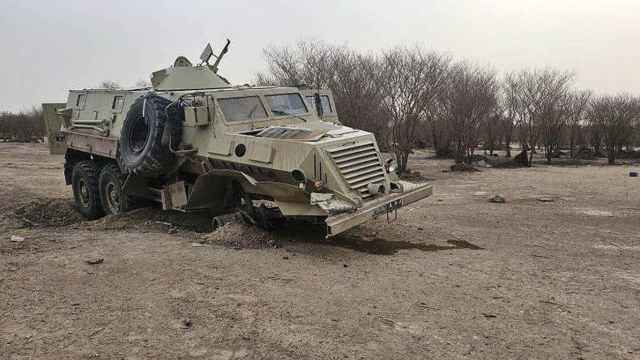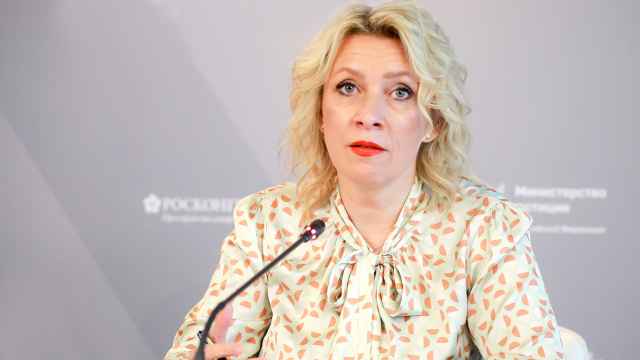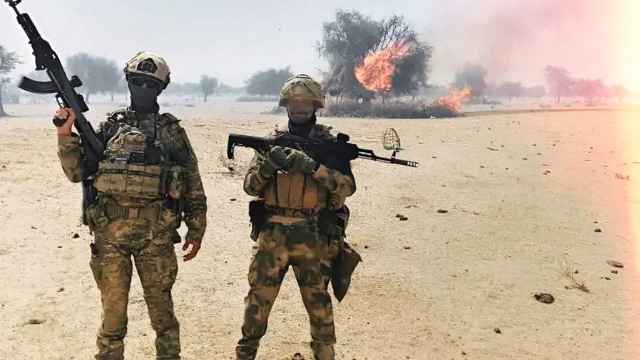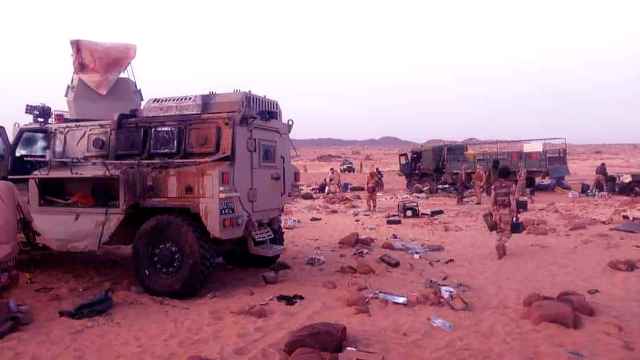GOMA, Congo — In a makeshift nightclub in the hull of the overnight ferry from Goma to Bukavu, a handful of teenage boys are trying out some new moves. Some land, some don’t. When they don’t, the elderly man on the bench next to us nudges us and rolls his eyes, amused.
The DJ, who has so far been playing the usual Afrobeats hits and Congolese rumba, whips out a more unexpected Communist crossover: the Russian Internationale — the pre-1944 Soviet national anthem — mixed with a Congolese beat. People immediately pack the dancefloor.
Here in eastern Congo, enthusiasm is palpable for the “Russians,” a catch-all term for the roughly 1,000 Eastern European mercenaries stationed in Goma as well as actual Russian mercenaries embedded in other fragile states — and the Russian government, which said in March that it approved a tentative military cooperation agreement with Kinshasa.
The reason is simple. Since 2022, this area has been mired in one of the world’s most catastrophic conflicts. With Rwanda’s help, the M23 militia has raped and massacred its way through the North Kivu province and is edging nearer to the regional capital Goma — close enough that, the night before, we could hear the rumble of explosions outside the city.
The conflict has displaced millions, wrecked lives and livelihoods and destroyed the modest tourist industry. Even the endangered mountain gorillas, the area’s most lucrative draw for visitors, have fled the besieged Virunga National Park to neighboring Rwanda.
With international attention taken up by the wars in Ukraine and Gaza, there is little interest in the crisis here and no hope of support from the West. The East African Community sent some soldiers early on, but the alliance quickly soured. Even the UN peacekeepers are packing up to leave.
Congo is desperate for help, and the only groups keen to step in are mercenaries, Russian and otherwise, circling to see what they can gain.
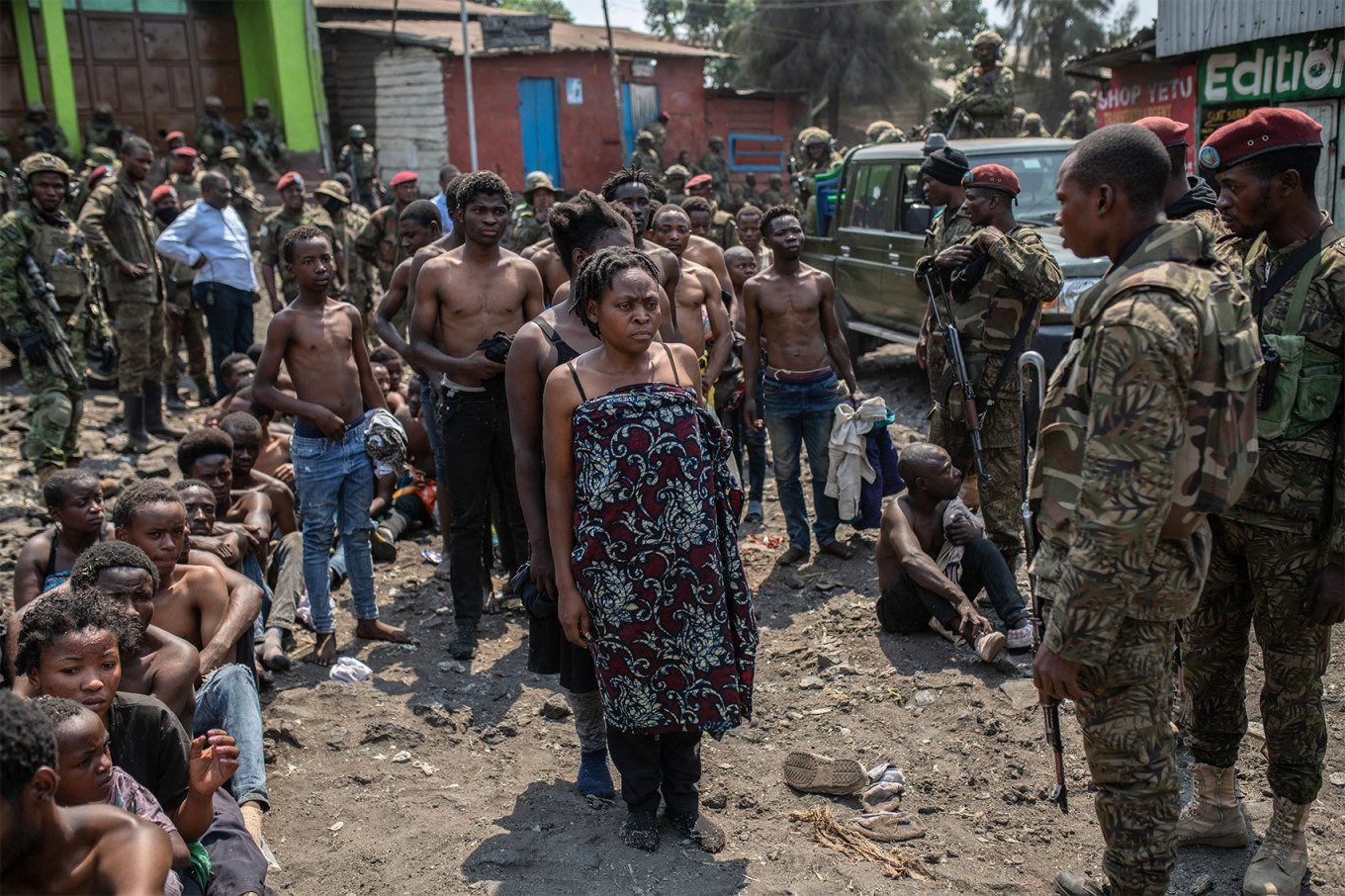
Increasingly, too, a complex web of military and commercial actors from Russia, China, UAE, the U.S., France, Bulgaria and Romania — the interests of which on paper should not overlap — appear to be working together to maximize this extraction.
Historically, inviting in foreign militaries and especially mercenary groups has gone spectacularly badly throughout Africa.
And while Russia may have pulled off an impressive PR feat by convincing Congolese citizens that it will be a genuine ally, its mercenary forces’ actions elsewhere on the continent tell a very different story.
“The Wagner Group and other emerging Russia-backed forces and ‘advisers’ exploit the resources and people of African countries for their personal gain. They are a threat to stability and prosperity in countries where they are present,” a spokesperson for the U.S. State Department said in an emailed statement.
“These forces do not lower terrorism but rather exacerbate the threat by pursuing draconian, violent tactics. This results in dramatic increases of cyclical violence,” the spokesperson added.
As Western countries sanctioned Moscow following its 2014 annexation of Crimea, the Kremlin began frantically pushing to sign military cooperation deals with various African nations. This included a May 2019 military agreement with Congo’s neighbor, Congo-Brazzaville/Republic of the Congo, that saw Russia send military specialists to the country and help maintain its Soviet-made equipment. The Kremlin claimed it inked a similar agreement with Congo earlier this year.
Since 2017, Russia has also aggressively expanded its military presence across Africa through the Wagner Group, a collection of front companies and Russian mercenary outfits formerly owned by the late businessman Yevgeny Prigozhin.
Once a close ally of President Vladimir Putin, Prigozhin launched the Wagner Group following the annexation of Crimea to further the Kremlin’s foreign policy goals even as sanctions piled up and the country became diplomatically isolated.
The U.S. designated the Wagner Group as a transnational criminal organization in January 2023, and the Treasury sanctioned connected individuals and companies.
But by May last year, it was believed to have around 5,000 mercenaries stationed in Africa — many of whom were former Russian soldiers and convicts.
Wagner troops have been detected in Mali, Sudan, Central African Republic, Libya and Mozambique, and its mercenaries have been accused of torture, rape, child abduction and summary execution of civilians. Wagner-linked companies are allegedly involved in gold smuggling and illegal mineral exploitation, using Cameroon as a logistics and transport hub. The group also engaged in election meddling (through AFRIC, Prigozhin’s fake election monitoring organization) in Congo, Zimbabwe, Madagascar, Mozambique and South Africa.
These activities tend to follow the same pattern, journalist Julia Steers said.
“Get into a country that has a complex and protracted conflict that has been unsolvable by other countries by selling security personnel, services and training, and then once you are in the country you take advantage of what that country has to offer — by propaganda in the media and civil society there, by getting the political class on your side,” she says.
That might be through exploitative businesses, as in the Central African Republic, she said, or straight-up resource extraction, as in Mali. But in any case, the question boils down to: “How can we take advantage of what this country has to offer once we have got our foot in the door through this security agreement?”
Steers was formerly VICE News’ Nairobi bureau chief and has spent years investigating and interviewing Wagner employees across the region, gaining rare access to their operations on the ground.
Wagner’s Africa strategy, Steers says, is to identify hotspots with vast mineral wealth that are beleaguered by conflict and present themselves as the solution.
“In reality, what we’ve seen is that they often just prolong the conflict in a different way,” she said.
The trick appears to be doing just enough to contain the worst militias that the population comes to accept abuse and exploitation as a necessary payoff.
“When I was first in the Central African Republic, the sentiment was very much, ‘Russia very bad, Wagner very bad, they’re slaughtering us’,” Steers said. “But when the rebels almost took Bangui, it truly was Wagner that prevented it from falling. The perception on the ground — and the reality on the ground — was that they are doing something.”
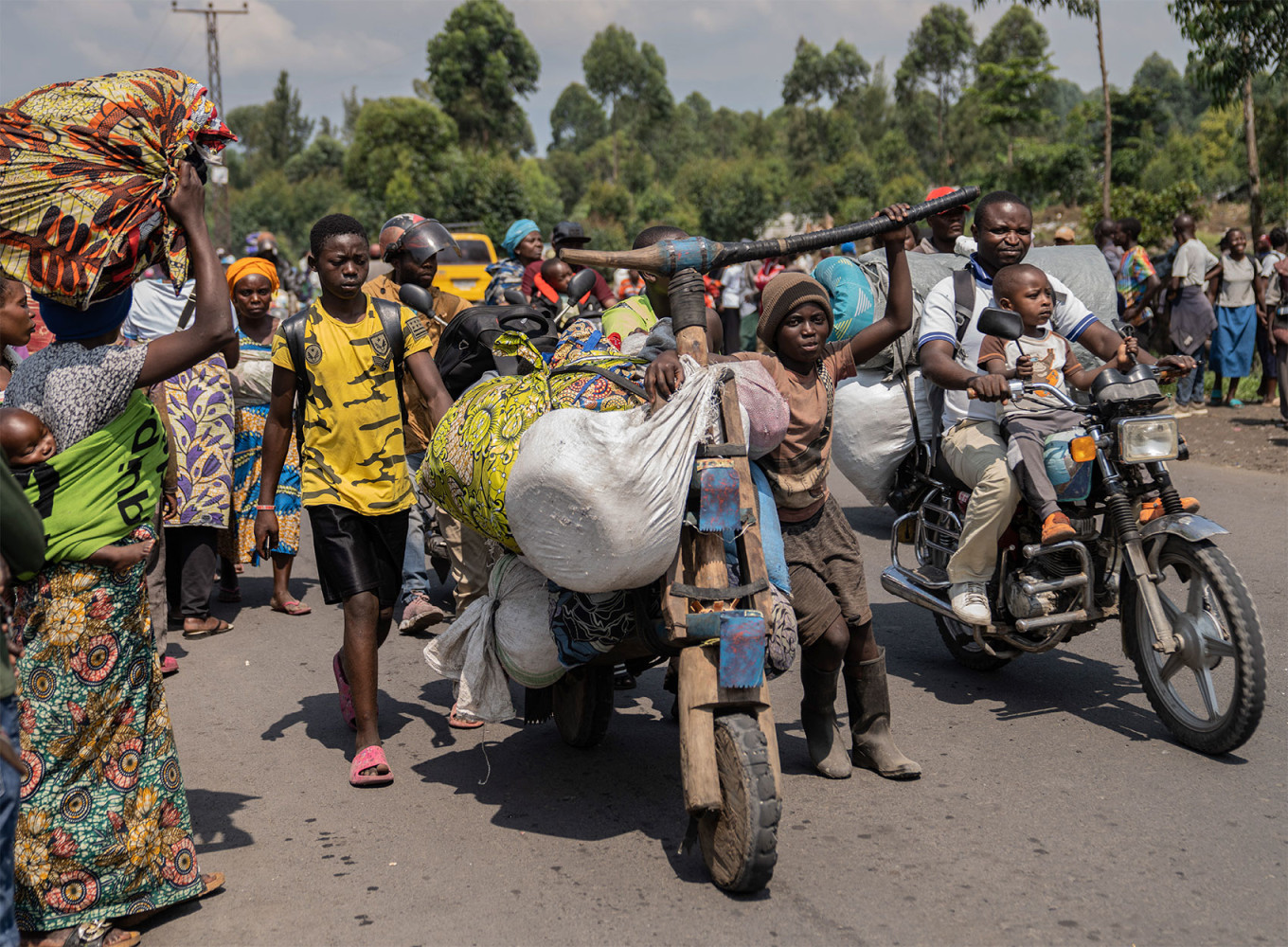
If a country is in dire enough straits, she said, the population starts to see “very, very incremental improvements” as a positive thing — “even at the cost of human rights.”
Prigozhin and several Wagner commanders died when an apparent explosion caused his private jet to crash in August 2023, two months after launching a short-lived mutiny that Putin called an act of treason.
But the Wagner Group lives on in Africa and is now reportedly directly controlled by the Kremlin under the new name Africa Corps.
In February, the BBC reported that General Andrei Averyanov, head of a Russian military intelligence unit that specializes in “targeting killings and destabilizing foreign governments,” had assumed leadership of Africa Corps and appeared to be striking deals with powerful warlords, coup leaders and military juntas in Libya, Burkina Faso, CAR, Mali and Niger to help consolidate control in return for signing away mineral rights to Russia.
The Kremlin said last June that the Russian state had no role in Wagner’s multimillion-dollar business interests in Africa.
Wagner/Africa Corp is hardly the first set of state-linked mercenaries to exploit security crises in African nations and gain access to valuable resources.
During the 1960s, as the last of the European colonial powers were pushed out of Africa by independence movements, several scrambled for ways to cling to whatever power they could, fearing that newly independent African states would align themselves with the Communist U.S.S.R.
Today, the private security contracting business in Congo is booming. The American Erik Prince, formerly of the notorious Blackwater group, was alleged by a UN report to have been discrediting MONUSCO peacekeeping services to potentially fill their role with his mercenaries.
The most prominent actor currently on the ground however is Horatiu Potra, the Romanian mercenary who openly operates his armed private security firm, Asociatia RALF, in eastern Congo. The armed security operators are officially there as military instructors and to guard key infrastructure like airports. But, from on-the-ground observations, they were also taking part in active combat missions in North Kivu.
The risk of foreign fighters operating inside Congo was brought to international attention this month when U.S. citizen Christian Malanga was shot dead while leading an attempted coup in Kinshasha. Another three U.S. citizens were detained by Congolese forces.
The motivations and wider support for the group involved in this failed attempt to seize power remain unclear, but the operation stands as a reminder that, even in 2024, foreign actors are still using armed force to gain control in this mineral-rich state.
Russia will capitalize on situations like this when it accuses many Western companies, governments, militaries and certainly private security forces operating in Africa of selfishness and exploitation.
The problem is that they have made it clear, at every juncture, that they will do the same.
“If Africa Corps, formerly Wagner, were to arrive in the DRC, their objectives would be the same as they have been elsewhere — and even more so — which is to strengthen and extend the influence of the Russian state and show the West as feckless and self-interested, although Russia is feckless and extremist, and really acting like a neo-colonial power in Africa,” says Vanda Felbab-Brown, co-director of the Africa Security Initiative at the Brookings Institution in Washington.
And while ideologically opposed countries — especially the U.S. and France on one side and Russia and China on the other — disparage each other’s predatory inclinations, behind the scenes, their most vocally patriotic mercenary leaders and mining investors appear more than happy to work together, forging dangerous alliances in spite of, rather than in support of, their respective countries’ interests.
Back in Goma, outside a building that locals identify as a “Russian” base, a mercenary with an Eastern European accent smirks when we ask him if he’s Russian or Romanian.
“It doesn’t matter where I’m from,” he says. “All that matters is that as long as we’re here, you’re safe.”
In a sense, it’s true — no matter where these mercenaries are from, the outcome will be the same. Rebel militias might be held back, at least a little, at least for a time — and in the long term, the country will see even more of its wealth and resources slip away into foreign hands.
But here in eastern Congo, where the most pressing priority is keeping the wolf from the door, it’s a risk politicians and the public appear willing to take.
A Message from The Moscow Times:
Dear readers,
We are facing unprecedented challenges. Russia's Prosecutor General's Office has designated The Moscow Times as an "undesirable" organization, criminalizing our work and putting our staff at risk of prosecution. This follows our earlier unjust labeling as a "foreign agent."
These actions are direct attempts to silence independent journalism in Russia. The authorities claim our work "discredits the decisions of the Russian leadership." We see things differently: we strive to provide accurate, unbiased reporting on Russia.
We, the journalists of The Moscow Times, refuse to be silenced. But to continue our work, we need your help.
Your support, no matter how small, makes a world of difference. If you can, please support us monthly starting from just $2. It's quick to set up, and every contribution makes a significant impact.
By supporting The Moscow Times, you're defending open, independent journalism in the face of repression. Thank you for standing with us.
Remind me later.


